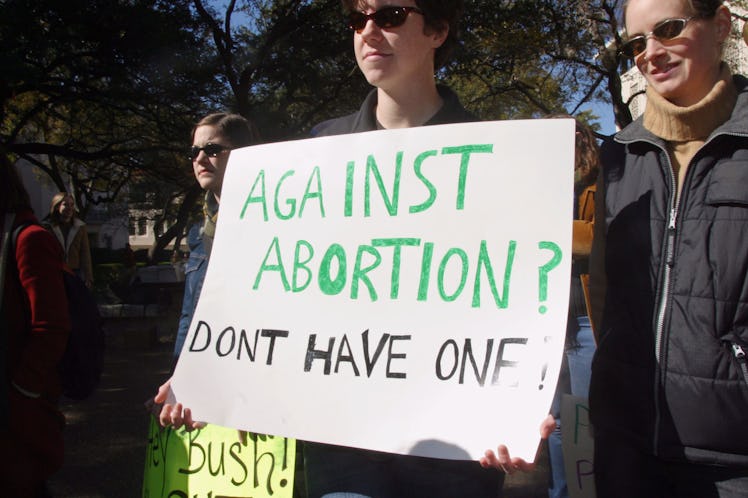
This Texas Abortion Bill Could Sentence Women To Death For Having An Abortion
In recent weeks, new abortion restriction bills seem to be popping up everyday across the country. However, there's one in particular that's being reintroduced, and it's the most severe yet. What's in Texas' new abortion bill you may ask? Here's a rundown, and it's pretty unbelievable.
On Wednesday, April 10, The Hill reported that a bill has been reintroduced by Republican Texas Rep. Tony Tinderholt that would criminalize abortion entirely, even in cases of rape and incest, but that's not all. House Bill 896, called the Abolition of Abortion in Texas Act, would not only outlaw abortion, but would make it so that women could be prosecuted for having the procedure done. That means they could be charged with homicide, which carries a possible death penalty in Texas, per The Washington Post. Abortion restrictions have often attempted to prosecute abortion providers for performing abortions under certain circumstances, but bills usually do not attempt to hold pregnant people criminally liable for obtaining an abortion. Hello everyone, and welcome to the latest installment of The Handmaid's Tale.
On April 10, Tinderholt shared a statement discussing why he introduced this severe measure. "My bill simply accomplishes one goal," Tinderholt's statement said, per Vox. "It brings equal treatment for unborn human beings under the law."
The bill was originally introduced by Tinderholt in 2017, according to The Hill, but due to huge outcry surrounding the measure, it was never passed. While this bill has gotten a lot of attention from Texan residents and both reproductive rights and anti-choice activists, the bill is unlikely to pass, since anti-abortion movements and activists have opposed punishing women for seeking an abortion, and some anti-abortion leaders have condemned the bill, per Vox.
This measure is just one of hundreds of state level bills that have been introduced in recent months that would restrict abortion access, or try to prohibit it all together. According to reproductive health group Planned Parenthood, as of March 2019 over 250 abortion restriction bills were introduced in 41 states across the country from 2018 to 2019, and there has been a 62.5 percent increase in six-week abortion bans, which have commonly been referred to as fetal heartbeat bills, compared to last year. In addition, reproductive health research group the Guttmacher Institute reported on April 3 that 28 state legislatures introduced abortion bans in the first quarter of 2019 alone.
While many of these bills have either been blocked or not yet passed, some are close to becoming law. On Friday, March 29, Georgia passed HB481, also known as Living Infants Fairness and Equality (LIFE) Act, which would prohibit abortion after a fetal heartbeat is detected by a physician (generally at about six weeks, which may be before some people know they're pregnant). Georgia Gov. Brian Kemp, who has openly supported HB481, has until May 12 to either sign or veto the legislation.
The Ohio legislature passed a similar measure on Tuesday, April 9, which would not only prohibit abortion after the heartbeat is detected, but would criminalize physicians if they performed the procedure after detecting a heartbeat. According to The Cincinnati Enquirer, under the bill physicians could face a fifth-degree felony if they perform an abortion after the six-week mark, which could lead to a year in prison or a $20,000 fine. Ohio Gov. Mike DeWine is expected to sign the bill into law, according to The Cincinnati Enquirer.
Even without Texas, there's still hundreds of abortion restriction bills that could severely impact the future of reproductive health for individuals. Want to learn more on the issue? Here's how.